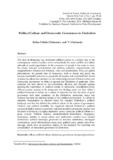Please use this identifier to cite or link to this item:
https://cris.library.msu.ac.zw//handle/11408/3804| Title: | Political culture and democratic governance in Zimbabwe | Authors: | Chikerema, Arthur Chakunda, Vincent |
Keywords: | Culture Political culture Democracy Governance governance |
Issue Date: | 2014 | Publisher: | American Research Institute for Policy Development | Series/Report no.: | Journal of Power, Politics and Governance; | Abstract: | The ideal of democracy has dominated political science as a subject area in the contemporary world of politics and is undoubtedly the most credible and valued principle of social organization. In the conscience of people it has come to mean the choice between constitutional and arbitrary authority, empowerment and marginalization, freedom and thraldom, voice and noiselessness. Thus as a global phenomenon, the general idea of democracy, both as theory and praxis has become inestimably seductive to practically all peoples and countries(Prah)1.Social Scientist has placed less attention on the relationship between Political culture and Democratic governance in Africa in general and Zimbabwe in particular. More emphasis has been placed on neo-colonialism, elections and electoral systems ignoring the importance of political culture in democratic consolidation.Every African country purport to be democratic but findings point out that, Africa`s political landscape is defines by a culture of impunity and that the ethos of good governance have been mutilated. As for Zimbabwe, democratic decay and violence has been the defining feature of the political environment. A culture of impunity characterized by electoral fraud has engulfed Zimbabwe`s political landscape and this has defined the political culture of the system of governance. Violence and political instability has negatively affected Zimbabwe`s political economy.Political culture is extremely vital and crucial for democratic practice and the ideal of democracy is highly dependent upon a particular political culture in a given country. Political violence, institutionalized intimidation, thugogracy, lawlessness, inability to accept defeat, and multivariate conflicts have marked Zimbabwe’s political landscape ,promoted by resource distribution, ideological contestations, social differentiation along class, political party, gender and ethnic cleavage, clearly have an enormous impact on the prospects for nurturing and consolidation of democratic governance in Zimbabwe. | URI: | http://jppgnet.com/journals/jppg/Vol_2_No_1_March_2014/6.pdf http://hdl.handle.net/11408/3804 |
ISSN: | 2372-4919 |
| Appears in Collections: | Research Papers |
Files in This Item:
| File | Description | Size | Format | |
|---|---|---|---|---|
| political culture.pdf | Abstract | 8.81 kB | Adobe PDF |  View/Open |
Page view(s)
206
checked on Feb 21, 2026
Download(s)
90
checked on Feb 21, 2026
Google ScholarTM
Check
Items in MSUIR are protected by copyright, with all rights reserved, unless otherwise indicated.



